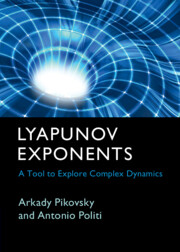Book contents
- Frontmatter
- Contents
- Preface
- 1 Introduction
- 2 The basics
- 3 Numerical methods
- 4 Lyapunov vectors
- 5 Fluctuations, finite-time and generalised exponents
- 6 Dimensions and dynamical entropies
- 7 Finite-amplitude exponents
- 8 Random systems
- 9 Coupled systems
- 10 High-dimensional systems: general
- 11 High-dimensional systems: Lyapunov vectors and finite-size effects
- 12 Applications
- Appendix A Reference models
- Appendix B Pseudocodes
- Appendix C Random matrices: some general formulas
- Appendix D Symbolic encoding
- Bibliography
- Index
8 - Random systems
Published online by Cambridge University Press: 05 February 2016
- Frontmatter
- Contents
- Preface
- 1 Introduction
- 2 The basics
- 3 Numerical methods
- 4 Lyapunov vectors
- 5 Fluctuations, finite-time and generalised exponents
- 6 Dimensions and dynamical entropies
- 7 Finite-amplitude exponents
- 8 Random systems
- 9 Coupled systems
- 10 High-dimensional systems: general
- 11 High-dimensional systems: Lyapunov vectors and finite-size effects
- 12 Applications
- Appendix A Reference models
- Appendix B Pseudocodes
- Appendix C Random matrices: some general formulas
- Appendix D Symbolic encoding
- Bibliography
- Index
Summary
The problem of computing Lyapunov exponents arises not only in the study of dynamical systems but also in the context of noisy or disordered linear systems. In the latter case, the fluctuating properties of the Jacobian (or, more generally, of the matrices which determine the linear dynamics) are given beforehand, when the structure of the noise is postulated, rather than emerging self-consistently from the evolution of a deterministic dynamical system. This simplification allows for the development of powerful analytic approaches, especially when the noise is assumed to be δ-correlated.
In the first section we discuss linear discrete-time systems, where the problem of determining the Lyapunov exponents can be formulated in terms of products of random matrices.We present various setups, starting from the case of weak disorder (noise), where the matrices are nearly equal to each other, and show that the variation of the Lyapunov exponents is generically proportional to the square of the disorder amplitude. For an arbitrary amplitude of noise, it is hard to extract analytic information on the entire spectrum of LEs, unless the dynamics is highly symmetric (essentially isotropic), as discussed in Section 8.1.2; otherwise, only the largest LE can be typically determined (in a more or less approximate way). The sparse matrices discussed in Section 8.1.3 provide one such setup, where it is even possible to detect a phase transition upon increasing the amount of disorder. Another setup where powerful semi-analytic techniques have been developed is when the disorder manifests itself as a selection among a few different options (polytomic noise).
The second section of this chapter is devoted to the analysis of continuous-time systems, i.e. of linear stochastic differential equations. One- and two-dimensional linear systems are first discussed in the presence of multiplicative noise. The general Khasminskii theory is then briefly reviewed in Section 8.2.3. Unfortunately, closed expressions of the LEs can be hardly obtained if the noise is not δ-correlated and, even less so, in high-dimensional spaces. A remarkable exception is the fully coupled setup discussed in Section 8.2.4, where the evaluation of the largest LE can be reduced to the computation of an eigenvalue of a Schrodinger operator.
The last section is devoted to a discussion of systems where noise and nonlinearities are simultaneously present.
- Type
- Chapter
- Information
- Lyapunov ExponentsA Tool to Explore Complex Dynamics, pp. 118 - 151Publisher: Cambridge University PressPrint publication year: 2016



